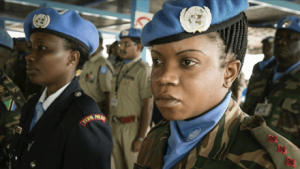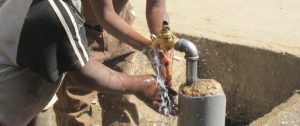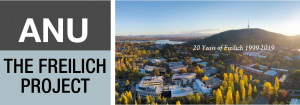Categories
-
ANU Africa Network
Posted on
by
This website was established in 2013 by David Lucas, and renovated and relaunched in 2020 as part of a project to increase awareness of Africa and African studies in the ANU and the ACT, funded by the Australian Government’s Department of Foreign Affairs and Trade.
Another outcome of that project was a major research report, published in August 2021, African Studies at the Australian National University and in the Australian Capital Territory, analyzing the past, present and future of the study of Africa at the Australian National University and the wider Australian University sector.

The major innovation on this updated website is the creation of the ACT Africa Expert Directory which lists experts on Africa from institutions around the ACT, primarily the ANU. We will continue to curate this list, offering a key resource for media, government and non-government organizations seeking expert facts and opinions on Africa. Individuals can request to be added to the list by contacting the website managers.
Another notable addition is the expanded directory of PhD theses on Africa produced in the territory’s universities, a solid measure of the vitality of the study of Africa in the city of Canberra.
Reviewing these directories, it is revealing to note that the vast majority of research on Africa is produced by disciplinary experts (environmental scientists, economists, demographers, etc.) rather than area studies experts. This means that the study of Africa is woven into the fabric of the research culture of the ANU and the ACT’s other universities in ways that are not necessarily apparent.
-
Mortality in Africa and elsewhere
Posted on
by
ANU School of Demography Seminar
Date and Time: Tuesday 2 July 2019 – 11.30am – 12.30 pm
Location: Jean Martin Room, Beryl Rawson Bldg #13, Ellery Crescent, ANU
Presenter: Dr Sam Clark, Ohio State University
Title: A General Mortality Model & Moving Verbal Autopsy from Research to Routine Use
Abstract
This seminar will have two parts. First, presentation of a formal mortality model, and second, discussion of efforts to rapidly improve information on cause of death where there are few data describing how people die.
High quality data describing all-age mortality are not available for many low and some middle-income countries, but almost all have good estimates of child mortality. I will present a general mortality model that uses child mortality to predict mortality at all ages in one-year age groups.
The distribution of deaths by cause and cause-specific mortality rates are fundamental to understanding and improving population health. About half of global deaths are unrecorded and a larger fraction do not have a meaningful cause assigned. I will discuss efforts to transform verbal autopsy from a bespoke research tool into a reliable method to assign cause of death in routine mortality surveillance at national scale in countries without well-functioning vital statistics systems.Bio note
Sam Clark is a formal demographer who works on the demography and epidemiology of Africa and developing new methods for population sciences. Right now he is working on:
• Improving the ‘verbal autopsy’ method used to quantify the burden of disease for populations without full coverage vital statistics systems – work with colleagues at The Ohio State University, the University of Washington, the London School of Hygiene and Tropical Medicine, the CDC, the Swiss Tropical and Public Health Institute, the WHO, and the ‘Data for Health’ Initiative
• Mapping child mortality at the subnational level through time using household survey data in countries without full coverage vital statistics systems – work with colleagues at the University of Washington and UNICEF
• Developing new population indicator measurement strategies and statistical methods to implement them – work with colleagues at the University of Washington
• Fertility and Mortality: variety of projects investigating levels and trends in fertility and mortality, mostly in Africa, and sometimes building models of age schedules of fertility and mortality that can be used widely as inputs to other analyses.
-
Gareth Evans on “The Responsibility to Protect in Africa”
Posted on
by
 On May 24, The Herbert and Valmae Freilich Project for the Study of Bigotry partnered with The Humanities Research Centre to host ANU Chancellor and former Foreign Affairs Minister, the Hon Gareth Evans, for the 2019 Africa Week lecture, on the topic “The Responsibility to Protect in Africa.”
On May 24, The Herbert and Valmae Freilich Project for the Study of Bigotry partnered with The Humanities Research Centre to host ANU Chancellor and former Foreign Affairs Minister, the Hon Gareth Evans, for the 2019 Africa Week lecture, on the topic “The Responsibility to Protect in Africa.”Further details and photos are available on the Freilich Project website, and the full transcript of this lecture is available from Prof. Evan’s personal website.
-
African Studies Reading Group – Thursday 27 June 2019 – Water Access and Agency in West Africa
Posted on
by
ANU African Studies Reading Group
Water Access and Agency: Thinking through Thresholds of Control
Standpipe in Bauchi, northern Nigeria (source: USAID.gov) As the African continent, and the world, becomes more globally interconnected, scholars and politicians alike have come to speak in terms of “flows” of people, things, technologies, and ideas. One particularly productive material to think through such flows is water. “Water is life,” and as an essential and intrinsically social resource, its containment can both reflect and produce politics of inclusion and exclusion. Although seeping across national borders and easy to scale-up, this presentation instead returns to the politics of the everyday and experiences of local communities. Looking at two very different case studies – standpipes (potable water) in Nigeria and traditional shrines (housing sacred water) in Ghana – the presenters explore links between water access, authority and ethics. By thinking through the threshold of taps and traditional shrines, we ask who wields the power of water, and for what profit? The presenters encourage comparison and conversation about how points of water access elicit power in cases across Africa.
Presenters:
Adegboyega Adeniran – Fenner School of Environment, Australian National University
Kirsty Wissing – School of Culture, History and Language, Australian National UniversityDate and time: Thursday 27 June 2019, 5pm
Location: Lady Wilson Room, Sir Roland Wilson Building, ANU (map)Refreshments provided / All welcome

